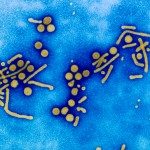Lien vers Pubmed [PMID] – 10823866
J. Virol. 2000 Jun;74(12):5587-96
Hepatitis C virus (HCV) of genotype 1 is the most resistant to interferon (IFN) therapy. Here, we have analyzed the response to IFN of the human cell line UHCV-11 engineered to inducibly express the entire HCV genotype 1a polyprotein. IFN-treated, induced UHCV cells were found to better support the growth of encephalomyocarditis virus (EMCV) than IFN-treated, uninduced cells. This showed that expression of the HCV proteins allowed the development of a partial resistance to the antiviral action of IFN. The nonstructural 5A (NS5A) protein of HCV has been reported to inhibit PKR, an IFN-induced kinase involved in the antiviral action of IFN, at the level of control of protein synthesis through the phosphorylation of the initiation factor eIF2alpha (M. Gale, Jr., C. M. Blakely, B. Kwieciszewski, S. L. Tan, M. Dossett, N. M. Tang, M. J. Korth, S. J. Polyak, D. R. Gretch, and M. G. Katze, Mol. Cell. Biol. 18:5208-5218, 1998). Accordingly, cell lines inducibly expressing NS5A were found to rescue EMCV growth (S. J. Polyak, D. M. Paschal, S. McArdle, M. J. Gale, Jr., D. Moradpour, and D. R. Gretch, Hepatology 29:1262-1271, 1999). In the present study we analyzed whether the resistance of UHCV-11 cells to IFN could also be attributed to inhibition of PKR. Confocal laser scanning microscopy showed no colocalization of PKR, which is diffuse throughout the cytoplasm, and the induced HCV proteins, which localize around the nucleus within the endoplasmic reticulum. The effect of expression of HCV proteins on PKR activity was assayed in a reporter assay and by direct analysis of the in vivo phosphorylation of eIF2alpha after treatment of cells with poly(I)-poly(C). We found that neither PKR activity nor eIF2alpha phosphorylation was affected by coexpression of the HCV proteins. In conclusion, expression of HCV proteins in their biological context interferes with the development of the antiviral action of IFN. Although the possibility that some inhibition of PKR (by either NS5A or another viral protein) occurs at a very localized level cannot be excluded, the resistance to IFN, resulting from the expression of the HCV proteins, cannot be explained solely by inhibition of the negative control of translation by PKR.
